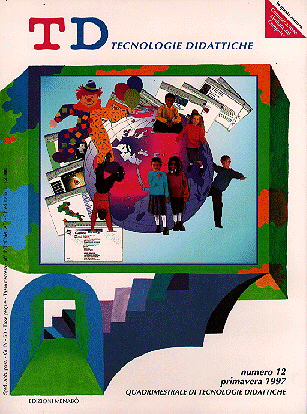Uno studio esplorativo di apprendimento cooperativo a distanza
Contenuto principale dell'articolo
Abstract
Dettagli dell'articolo
Sezione
Gli autori che pubblicano su questa rivista accettano le seguenti condizioni:
- Gli autori mantengono i diritti sulla loro opera e cedono alla rivista il diritto di prima pubblicazione dell'opera, contemporaneamente licenziata sotto una Licenza Creative Commons CC BY 4.0 Attribution 4.0 International License.
- Gli autori possono aderire ad altri accordi di licenza non esclusiva per la distribuzione della versione dell'opera pubblicata (es. depositarla in un archivio istituzionale o pubblicarla in una monografia), a patto di indicare che la prima pubblicazione è avvenuta su questa rivista.
- Gli autori possono diffondere la loro opera online (es. in repository istituzionali o nel loro sito web) prima e durante il processo di submission, poiché può portare a scambi produttivi e aumentare le citazioni dell'opera pubblicata (Vedi The effect of Open Access).
Riferimenti bibliografici
Bos E.S., Kikstra A., & Morgan C.M. (1996). Multiple Levels of Use of the web as a Learning Tool, in Proceedings of ED-TELECOM 96, Boston, Mass., June 17-22, 1996, AACE, 31-36.
Brown A.L., & Campione J.C. (1990). Communities of learning or a context by any other name, in D. Kuhn (ed), Contributions to Human Development, vol. 21, 108-126.
Collins A., Seely Brown J., & Newman S.E. (1989). Cognitive apprenticeship: Teaching the crafts of reading, writing, and mathematics, in L.B. Resnick (ed), Knowing, Learning, and Instruction. Essays in honor of Robert Glaser, Hillsdale, NJ: Erlbaum.
Duffy T.M., & Jonassen D.H. (1992). Constructivism and the Technology of Instruction. A Conversation . Hillsdale, NJ: Erlbaum.
Forman, E.A., Minick, N., & Stone, C.A. (Eds). (1993). Contexts for Learning: Sociocultural Dynamics in Children’s Development. New York: Oxford University Press.
Halliday, M.A.K. (1978). The social interpretation of language and meaning. London, UK: University Park Press.
Lin, Bransford, et al. (1995). Instructional design and development of learning communities: An invitation to a dialogue, Educational technology, vol. 35(5), 53-63.
Riel M.M., & Levin J.A. (1990). Building electronic communities: Successes and failures in computer networking, Instructional Sciences, vol. 19, 145-169.
Rocco E., & Warglien M. (1995). La comunicazione mediata da computer e l’emergere dell’opportunismo elettronico, Sistemi Intelligenti, vol. 7(3), 393-420.
Rossman P. (1992). The emerging Worldwide Electronic University. Information age, global higher education, Westport, Greenwood Press.
Scardamalia M., Bereiter C., Lamon M. (1994). The CSILE Project: Trying to bring the classroom into world3, in K. McGilly (ed), Learning Lessons, Boston, MA: M.I.T. Press.
Steffe L.S., & Gale J. (1995). Constructivism in Education, Hillsdale, NJ: Erlbaum.
Wild R.H., & Winniford M.A. (1993). Remote collaboration among students using electronic mail, in Computer Education, vol. 21(3), 193-203.

